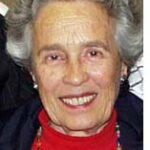By Eileen Wingard

ENCINITAS, California — Cantor William Tiep, of Temple Solel, is to be commended for having the temple cosponsor a concert of Jewish Music, presented last Saturday evening by the Grossmont Symphony Orchestra and Master Chorale, in the temple’s Social Hall. The program, scheduled between Rosh Hashana and Yom Kippur, featured a varied assortment of classical music, each with a Jewish connection. Conductor Randall Tweed expressed appreciation to Cantor Emeritus Sheldon Merel and Rabbi/Cantor Arlene Bernstein, of Congregation Beth Israel, for helping select the repertoire for the program.
Temple Solel’s Social Hall was nearly full, with an appreciative audience that experienced music ranging from John Williams’ emotional film score for Schindler’s List, to Gustav Mahler’s monumental Totenfeier.
The Schindler’s List three movement suite was accompanied by a power point display of images from the movie. The visuals served to enhance the poignant music. Williams may have listened to early Israeli songs and Yiddish folk music because the first theme is reminiscent of the song, Al S’fat Yam Kinneret, and the last movement has echos of Oif’n Pripetchok. The violin solos were played with heartfelt emotion by the orchestra’s concertmaster and Grossmont College faculty member, Ondrej Lewit.
This was followed by two works by Salamone de’ Rossi (1570-1630), the Jewish violinist and composer in the court of Mantua. Haleluyah, with words of Psalm 146, and the familiar hymn, Adon Olam, were both sung in Hebrew, a cappella, by the Grossmont Master Chorale. The texts of the familiar psalm and hymn were set to pure Baroque music that might have been written by Palestrina. There was a great deal of polyphony and solo voices alternating with the larger chorus. The Chorale proved to be a well-blended ensemble with excellent Hebrew diction. When I sometimes react negatively to Hebrew texts set to music which have not even a “pintele Yid” of Jewish musical connection, I remind myself of the opening words of Psalm 96, “O sing unto the Lord a new song.” Today, after all, we hear liturgical music that resembles American folk music and even rock and roll. Many Jewish composers write music in the style of the composers among whom they live. It was not until the Russian Jewish Folk Music Society, formed in 1908, that Jewish composers were encouraged by the Russian composer and pedagogue, Rimsky-Korsakov, to look to their own Jewish folk music and synagogue cantillation for inspiration. Some, like Bernstein and a few in Israel, take that advice, while others do not.
Although Ernest Bloch did not consider his Suite Modale for flute and strings part of his Jewish-themed works, and the final fourth movement’s Allegro deciso certainly sounds Baroque-inspired, sections of the first two movements have expressive, minor-keyed melodies which might have been influenced by Jewish folk music. Flute soloist, Suzanne Kennedy, played with expressive tone and firm breath control.
After intermission, the Chorale’s women and orchestra joined forces with mezzo-soprano, Ava Baker Liss as soloist in Mario Castelnuovo Tedesco’s cantata, Naomi and Ruth. This was sung in English. The soloist was cast in the role of Naomi, while the chorus represented both the narrator and Ruth, climaxing with those memorable words of loyalty and devotion, “Whither thou goest, I will go. And where thou lodgest, I will lodge. Thy people shall be my people, and thy God, my God.”
Although the balance did not always allow for Liss’s words to be entirely audible, the general effect was very moving.
For the final work, Gustav Mahler’s Totenfeier, Tweed prepared his listeners by telling us that the opening thematic gesture, articulated frequently by the celli, represented the eternal question, “What is the meaning of life?”
The orchestration journeyed through sections of great intensity, only to recede to barely audible timpani taps, then rise again before the concluding musical query, as death’s finality is mirrored in the last notes. The effective performance elicited a standing ovation for Dr. Randall Tweed and his well-trained forces.
With a string quintet of skilled professionals leading and coaching the string sections, and some professional members in the other sections, the Grossmont Orchestra, under the skilled direction of Dr. Tweed, achieved a high level of performance. All their renditions were satisfying, with the music conveying the essential message of the composers.
This was truly a special treat for the North County congregation and all who attended.
Whereas many Christian churches have concert series at their venues, the only Jewish house of worship that currently hosts a series is Tifereth Israel Synagogue in the San Carlos section of San Diego, where conductor David Amos conducts the Tifereth Israel Community Orchestra (TICO) in a series of concerts, some with works of Jewish content.
When Cantor Merel officiated at Congregation Beth Israel, he had annual concerts with choirs and TICO showcasing chorale works by synagogue composers. And, in past years, the old JCC at 54th Street and the Lawrence Family JCC in La Jolla had a Jewish Music Series, even hiring the San Diego Symphony at Symphony Hall with cantorial soloists from the community and outstanding instrumental soloists such as violinist Zina Schiff and cellist Marcia Bookstein.
The Lipinsky Jewish Arts Festival of the San Diego Repertory Theatre occasionally has a classical evening.
Lately, however, Jewish classical music has not been heard too often in our city.
Thank you, Cantor Tiep, for facilitating this wonderful evening. Hopefully, this will occur again in the near future.
*
Wingard is a former violinist with the San Diego Symphony Orchestra and a freelance writer specializing in the arts. She may be contacted via eileen.wingard@sdjewishworld.com